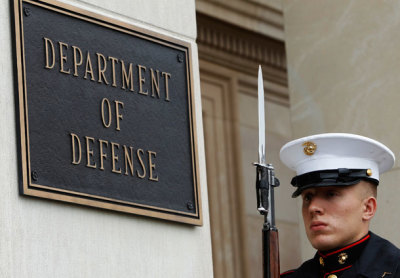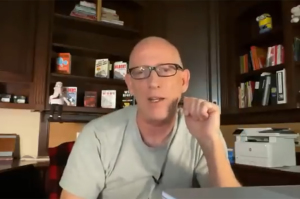National defense: Playing catch-up again?

First came the startling news from the unlikely source of London’s Financial Times that last summer “China tested a nuclear-capable hypersonic missile…that circled the globe before speeding toward its target, demonstrating an advanced space capability that caught U.S. intelligence by surprise.”
I don’t know which part of that news flash I find more alarming — that they tested such a dangerous missile or that our spy agencies were “surprised.” Both statements should be cause for alarm. The development of this missile signals China’s intention to catch up or surpass America in nuclear deterrence, and the intention to develop a “first strike” capability against the U.S. And, if the U.S. spy networks were surprised, what else don’t they know?
Add the recently discovered information that China is building over 200 missile silos in their western desert to house ICBM missiles, and our national defense alarm should be sounding at a fever pitch.
So, what kind of missile has China evidently tested? What is a “hypersonic missile that circled the globe before speeding to its target?”
“Hypersonic” is an aerodynamics term defining speeds at least 5 times the speed of sound or “Mach 5 and above.” That is very fast and is destabilizing to missile defense systems. Additionally, the Chinese missile was a “Fractional Orbital Bombardment System (FOBS) missile which goes into partial orbit around the Earth to strike targets from an unexpected direction while avoiding radar detection and anti-missile defenses."
Russia is also pursuing this research, but it appears that China has surged ahead of both Russia and the U.S. in this new technology.
I have been informed by knowledgeable Defense and former Defense Department officials who asked to remain anonymous that the U.S. was on the verge of pursuing the development of this technology at the beginning of President Obama’s second term (2012-13) when the President vetoed any financial support for the project. While America slept, China persevered.
So once again, the U.S. is playing that very dangerous national defense game called, “Playing Catch-up.” Why is it dangerous? If you are too long “asleep at the wheel,” you can be defeated by a technologically superior enemy.
It has happened to the U.S. before, and more than once. The Chairman of the Joint Chiefs of Staff, General Mark Milley, has described the testing of the Chinese hypersonic missile as “very close” to a “Sputnik moment” and the successful Chinese tests were a “very significant technological event."
On Oct. 4, 1957, the Soviet Union launched the first satellite into space, heralding the beginning of the “space age.” Americans were shocked. Were the Russians ahead of us? It turned out that we could have accomplished the same feat at least two years earlier, but the Eisenhower administration didn’t think it was that important.
After the initial shock, having started through lack of foresight well behind the Russians, we caught and surpassed them, testified to by the first successful moon landing on July 20, 1969. If the Russians had won the space race, there would have been dire military consequences for America.
Earlier, we came perilously close to losing the greatest struggle for human freedom and dignity in the 20th century — the Second World War. As Germany and Japan prepared for war and world conquest at a breakneck pace, America was a third-rate land and air power with a semi first-class Navy.
FDR perceived the threat to America’s security and did everything he could do to prepare America for a war he believed was inevitable and that it was to America’s advantage to enter earlier rather than later and make all preparations to be victorious.
Among the most important of those preparations was the passage of the “Selective Training and Service Act of 1940,” otherwise known as the “draft.” The act required that men between 21 and 35 register with local draft boards set up across the nation, and it was passed in September 1940. Without the passage of that bill, it would have taken the nation at least a year longer to mobilize its manpower to fight and win World War II against Germany and Japan. By then, it might very well have been too late to secure victory, rather than defeat.
The bill authorizing extending the draft passed by one vote. An interesting side note: I had a roommate at Princeton whose father was Rep. Orrin Harris, a Democrat from Arkansas. My roommate once asked his father, “What was the most important vote he cast while in Congress?”
He answered, “The vote to extend the draft in 1941.” His father explained that it was going to be a very close vote and Congressman Harris was from a very isolationist district. The day before the vote, freshman Congressman Harris received a phone call from Franklin Roosevelt who explained, “This draft vote is very important, and I need your vote. I know the people in your district are against it, but I’m your President and I’m asking you for your vote.” Congressman Harris voted “yea” and it passed the House of Representatives by one vote on Aug. 12, 1940, less than four months before the Japanese attacked Pearl Harbor. If that bill had not passed, it would have been difficult to mobilize our manpower in time to win World War II.
I hope that America learns the lessons of history and responds very quickly to this direct Chinese threat. We avoided war with the Soviet Union during the Cold War because we were prepared militarily and we had a credible nuclear deterrent triad of land, air, and submarine nuclear missiles which guaranteed that even if the Soviets attacked us first, we could still launch a strike which would destroy the Soviet Union.
At the height of the Cold War, former President Nixon explained, “The only reason anyone anywhere in the world goes to bed with any degree of freedom is because of the armed might of the United States and its willingness to use it to defend itself and its neighbors.”
No nation ever was attacked for being too strong. Weakness or indecision in national defense tempts aggressors to attack.
The closest we have come to nuclear war so far in the Atomic Age was the Cuban Missile Crisis in October 1962. Nikita Khrushchev, the leader of the Soviet Union, misinterpreted President Kennedy’s indecisiveness at the Bay of Pigs in 1961 as weakness and did not realize his mistake until we came within hours of a conflict that could have very easily disintegrated into a devastating nuclear exchange.
The Chinese are clearly preparing to reach a point where they can blunt any threat of American nuclear weapons being used to prevent them from conquering Taiwan by military force. In many ways, Taiwan is shaping up as the trigger point for America and China in the same way that Berlin and Cuba were the trigger points in the struggle between the Soviet Union and America.
As Christians, we are called to be peacemakers. For most of Christian history, the vast majority of Christians have used some form of “Just War” Theory to guide them on the morality of when, if, and under what circumstances they as Christians can participate in armed conflict. Wars of aggression or conquest are never defensible in Just War Theory. Only defensive war is permissible. That does not necessarily mean that a nation has to wait to be attacked. If the evidence is irrefutable that a nation, or nations, are preparing to attack you, you are permitted, under Just War Theory, to initiate offensive military action.
The classic illustration of this is in the “Six-Day War” between Israel and her neighbors in 1967. It was manifestly clear that Egypt, Syria, and Jordan were preparing an all-out attack “to drive Israel into the sea.” Israel struck first and won the war in the first hour.
Similarly, if the U.S. Navy had encountered the Japanese Fleet cruising an hour from Pearl Harbor under radio silence, they would have considered that an act of war and would have initiated military action to protect the Pacific Fleet at Pearl Harbor.
Unless we are prepared to accept Communist Chinese hegemony over all the Pacific up to the shores of Hawaii, and north of Australia, including the loss of not only Taiwan, but Japan, the Philippines, Indonesia, and all of Southeast Asia, we must respond to this challenge in ways that prevent military hostilities from commencing. The best way to do that is to convince the Chinese Communist Party which rules China they cannot take Taiwan by force, and they cannot neutralize the American nuclear deterrent.
How do we do that? First, we stay ahead of them in military research and deployment of the results of that research. Second, we demonstrate that we have the backbone to exercise that military power in defense not only of ourselves but also of our allies.
Unfortunately, as the Chinese missile tests demonstrate, we are behind in this one critical area, and we are being forced to play that most American of games, “catch-up.” We must do so with all deliberate speed, or the cause of liberty and freedom in the world will suffer a terrible defeat with tragic human consequences.
Dr. Richard Land, BA (Princeton, magna cum laude); D.Phil. (Oxford); Th.M (New Orleans Seminary). Dr. Land served as President of Southern Evangelical Seminary from July 2013 until July 2021. Upon his retirement, he was honored as President Emeritus and he continues to serve as an Adjunct Professor of Theology & Ethics. Dr. Land previously served as President of the Southern Baptist Convention's Ethics & Religious Liberty Commission (1988-2013) where he was also honored as President Emeritus upon his retirement. Dr. Land has also served as an Executive Editor and columnist for The Christian Post since 2011.
Dr. Land explores many timely and critical topics in his daily radio feature, “Bringing Every Thought Captive,” and in his weekly column for CP.



























